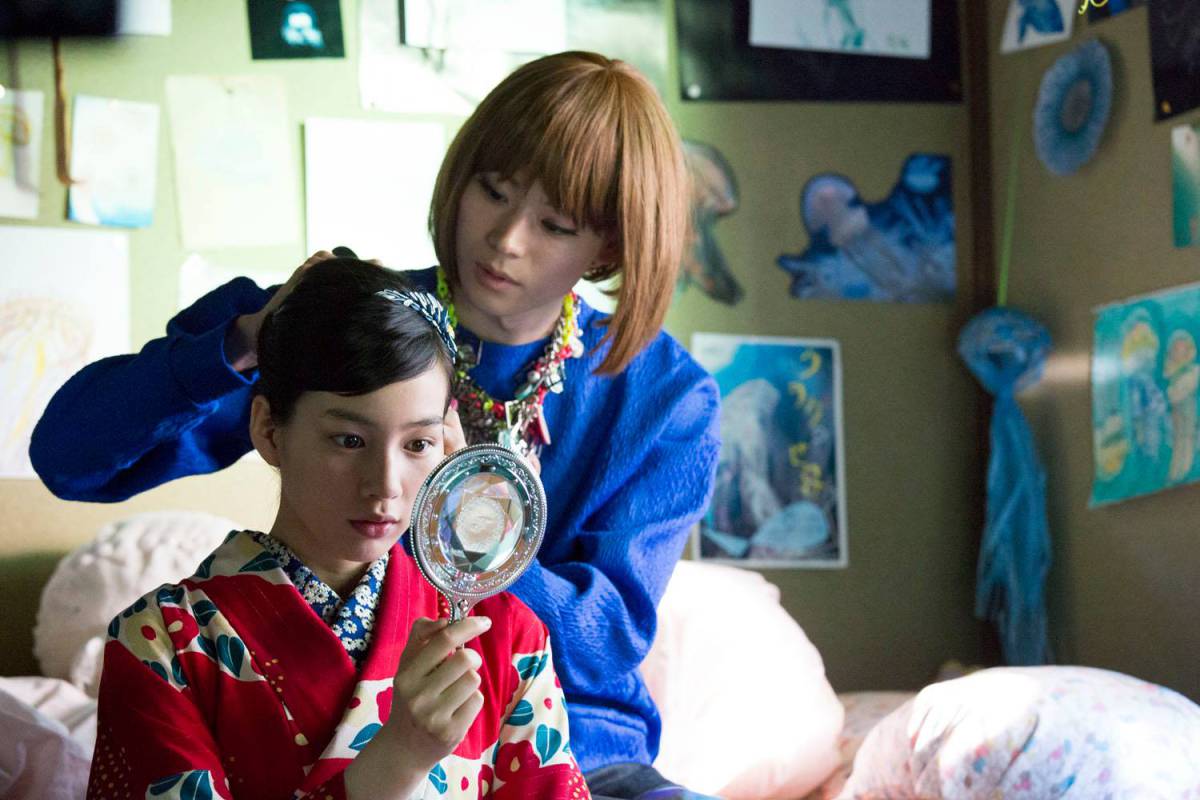By Chlotrudis Independent Film Society
Rating: 4.25 cats
Director: Taisuke Kawamura

Original language title: Kurage Hime
Country: japan
Year: 2015
Running time: 126
IMDB: https://en.wikipedia.org/wiki/Princess_Jellyfish
Jason says: “Though the audience for comic books in America – and symbiotically, comic-book movies – has been growing broader in the past few years, the variety of material has lagged a bit, and we’ll probably never catch up to Japan, where a romance comic that involves jellyfish, dressmaking, and cross-dressing can be popular enough to continue for dozens of installments in phone-book-sized weekly anthologies and spawn both animated and live-action adaptations. As unlikely as the material may seem, it makes for a romantic comedy as entertaining as it is off-beat.
“The title character is Tsukimi Kurashita (Rena Nounen), although she’d argue that her late mother was a bit off-base in declaring every girl grows up to be a princess. Today, she’s an aspiring manga artist who loves jellyfish but has some pretty crippling self-image issues, living in ‘Amamizukan’ boarding house with a handful of other girls with their own obsessions and the same nervousness around boys and confident girls that Tsukimi has. Still, she’s able to summon the courage to yell at a pet-store employee who has two jellies that need different types of water in the same tank, getting support from the sort of tall model-type girl that typically terrifies her – and when she discovers that this girl is actually Kuranosuke Koibuchi (Masaki Suda), son of a local politician (Sei Hiraizumi) who violates the ‘no boys allowed rule no matter how good he looks in heels and a miniskirt. Oh, and he’s got a cute but timid half-brother, Shu (Hiromi Hasegawa), who develops a bit of a crush on Tsukimi after Kuranosuke gives her a makeover for an afternoon out.
“The plot that develops – a monolithic developer with a bitchy representative (Nana Katase) planning to tear the girls’ building down and Kuranosuke’s plans to fight them by creating a line of jellyfish-inspired dresses – is silly but committed to with genuine sincerity. While it has its ridiculous moments, and isn’t perfect in terms of giving everyone in the cast something to do, it also leads to spots that are both hilarious and uplifting. Most importantly, the filmmakers never forget that it’s there as a way to make Tuskimi and Kuranosuke a team than just its own thing. It gets the movie to a pretty nice ending point, too, where there’s room for more but the important work seems to be done.
“That team is tremendously appealing, too. Rena Nounen and Masaki Suda give Tuskimi and Kuranosuke perfectly complementary reserved and brash natures with an easy common ground. There’s great chemistry there for both romance and best friends (with Suda’s looking pretty passable in a dress helping out in terms of giving the latter more prominence), and they’re fun individually as well: Nounen gives Tsukimi a sweet charm that does a nice job of making the audience believe that she doesn’t realize how cute she is, while Suda comes right at every facet of Kuranosuke without reservation while still letting the audience see that he fits in with the odd girls of Amamizukan as well as he fakes fitting in everywhere else. Hiromi Hasegawa has kind of a thankless job as Shu – this sort of good-hearted but boring character shows up a lot in Japanese films, and Hasegawa does okay but can’t make him more than an interesting fallback – while Nana Katase at least seems to enjoy being bad. Mokomichi Hayam is a secret weapon as the Koibuchi family chauffeur who makes every scene he’s in funnier – and who, like every likable character in the movie, is a bit of a nerd where something is concerned himself, though he owns it with confidence.
“As much as I found this movie super-cute and highly enjoyable, I’m kind of glad that it was distilled down to a couple of hours from what certainly seems like the sort of manga that can go on seemingly forever past its natural conclusion. Screenwriter Toshiyo Ohno and director Taisuke Kawamura do well to streamline it into something that has pretty good forward motion even preserving shojo manga’s tendency for asides, waving away some of the sillier bits of plot. There are certainly moments when an even less literal translation could help: The ‘petrification’ gags and some of the designs for the other otaku girls could be toned down, being just a hair too broad for the rest of the movie.
“Those are nitpicks, for the most part; the filmmakers take a broad premise and make something as sweet as it is silly. It’s open-ended enough for a sequel, and I certainly wouldn’t mind seeing Rena Nounen and Masaki Suda back to see where these folks go next. 4.25 cats
“Seen 25 July 2015 in Theatre Hall Concordia (Fantasia InternationalFilm Festival, DCP)”
